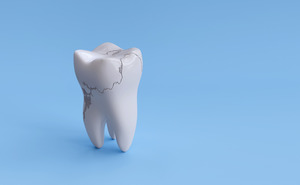
While root canal treatment is an effective way to save an infected tooth, it is not completely without risk. On rare occasions, the treated tooth may end up fracturing. Why exactly does this happen? How will you know if it does? And what should you do about it? Knowing the answers to these questions can help you prepare for a worst-case scenario. As such, here’s a look at everything you need to know when it comes to a cracked root canal tooth.
Why Do Teeth Sometimes Crack After a Root Canal Treatment?
Root canal treatment involves creating an opening in your tooth and taking out the infected pulp. Removing the inner parts of the tooth along with some of its enamel will naturally weaken the overall dental structure. Thus, your tooth will be more susceptible to damage in general and will have a higher chance of fracturing.
There are multiple ways a tooth can become cracked following a root canal procedure, such as:
- Trying to bite and chew with it before it has been restored.
- Habitually grinding and clenching your teeth.
- Suffering a sudden blow to the mouth or jaw in an accident.
How Will You Know If a Tooth Cracks After Root Canal Treatment?
A crack in your tooth won’t always be visible, but it will often be accompanied by the following symptoms:
- Pain that occurs when using the tooth in question to bite or chew.
- Sensitivity to foods that are particularly hot, cold, or sweet.
- A rough or sharp edge that you can feel with your tongue.
- Painful or swollen gum tissue.
What Should You Do If Your Root Canal Tooth is Cracked?
The best thing to do if your root canal tooth fractures is to reach out to your endodontist or your dentist. The sooner a trained professional is able to take a look at your tooth, the sooner they can figure out the best steps to deal with it.
In the meantime, it will be up to you to make sure that the problem doesn’t grow any worse before you can get the treatment you need. As such, you should stay away from particularly hard or crunchy foods for the time being; they could easily end up damaging the tooth further.
Since the cracked tooth could potentially be susceptible to reinfection, you will need to make a point of practicing excellent oral hygiene. Be sure to brush at least two times a day and floss once a day. Remember to be gentle while you’re cleaning the area around the damaged tooth.
Noticing a cracked tooth after a root canal treatment can be alarming, but as long as you act quickly and follow the right steps, you’ll be able to protect your smile and get your oral health back on track.
About the Author
Dr. Ramin Rahmani is our reliable endodontist at North Jersey Endodontic Group of Paramus. He received his initial dental education at the New York University College of Dentistry. Once he realized he wanted to become an endodontist, he completed an advanced education program in Endodontics at NYU. He enjoys having the chance to help patients find relief from tooth pain with root canal treatment. If you think you have an infected tooth, you can schedule a consultation with Dr. Rahmani by visiting his website or calling (201) 265-3334.
